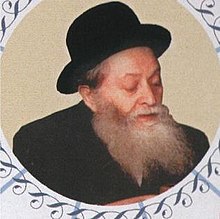| This article needs additional citations for verification. Please help improve this article by adding citations to reliable sources. Unsourced material may be challenged and removed. Find sources: "Yom-Tov Ehrlich" – news · newspapers · books · scholar · JSTOR (July 2008) (Learn how and when to remove this message) |
| This article relies largely or entirely on a single source. Relevant discussion may be found on the talk page. Please help improve this article by introducing citations to additional sources. Find sources: "Yom-Tov Ehrlich" – news · newspapers · books · scholar · JSTOR (March 2020) |
| Yom-Tov Ehrlich | |
|---|---|
 Yom-Tov Ehrlich Yom-Tov Ehrlich | |
| Background information | |
| Born | 1914 Kozhan Gorodok, Russian Empire |
| Died | 1990 |
Rabbi Yom-Tov Ehrlich (Hebrew: יום-טוב עהרליך) (1914–1990) was a renowned Hasidic musician, composer, lyricist, recording artist, and popular entertainer known for his popular Yiddish music albums. He was born in a small village, Kozhan Gorodok, Russian Empire, and raised in a nearby village, Davyd-Haradok, Belarus (then Poland). He survived the Holocaust in Samarkand, Soviet Union. Later, he moved to Williamsburg, Brooklyn, New York.
Ehrlich was born to a family of Karlin-Stoliner Hasidim. His grandfather, Yom Tov Simcha Ehrlich, was an aide to Rabbi Aharon of Karlin, an early leader of the Hasidic movement. Ehrlich himself was a Hasid of the late Rabbi Yochanan Perlow of Karlin.
Some of Ehrlich's favorite songs were later recorded by other popular Hasidic entertainers, such as Mordechai Ben David, Lipa Shmeltzer,Levy Falkowitz and Avraham Fried, although Ehrlich himself used Russian classical and folk melodies to his own Yiddish lyrics.
His most popular songs include: "Yakkob", the tale of a Jew in Uzbekistan during the Holocaust; "Shloof mein kind" ("Sleep, my child"), the song of a Jewish woman who finds a child alone in the woods during the Holocaust; and "Williamsburg", a song about Hasidic Williamsburg during the 1950s.
Discography
- The Wandering Jewish Folk Singer
- Yiddish Nachas (1960)
- Torah (1961)
- T'shuva (1962)
- Shema B'ni (1963)
- Ameritchka (1964)
- Emunah (1965)
- Shabbos (1967)
- Luksus (Double Album) (1967)
- Chevlei Moshiach (Double Album) (1969)
- Shabchi Yerushalayim (1970)
- Middois (1973)
- Dai (1974)
- Shelo Asani Goy (1975)
- Journey Through Song 1 - Lamnatzeach B'naginos (1975)
- Journey Through Song 2 - Mizmor L'sodah (1975)
- Kol Mevaser (1977)
- Yetzias Mitzrayim (2 Volumes) (1978)
- Chessed
- Elliyohu Hanuvee
- A Shabbus Mitten Rebben
- Der Satmerer Rebbe (2 Volumes) (1981)
- Der Baal Shem Tov (2 Volumes)
- Emunas Tzadikim
- Shoshanas Yaakov
- Ashreinu (2 Volumes)
- Hallel
- Rannenu Tzadikim (2 Volumes)
- Modeh Ani
- Bitachon